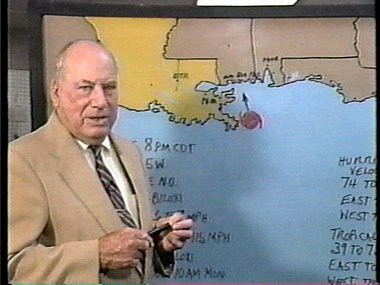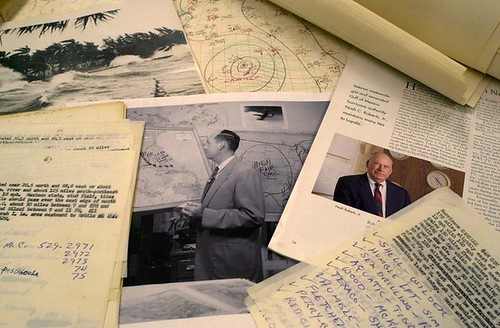Times-Picayune Staff Video capture photo courtesy of WWL-TV--Nash Roberts, retired weather forecaster at WWL-TV
"
 "
"Meteorologist Nash Roberts with his grease pencil

Nash and his maps
Legendary TV weatherman Nash C. Roberts Jr., revered as much for his calm, level-headed presence as the accuracy of his hurricane path projections, has died at age 92, WWL-TV has reported. See Article in full below from Nola.com
For more than 50 years, Gulf Coast weather-watchers relied on Mr. Roberts to tell them where tropical storms would come ashore.
From before Hurricane Betsy in 1965 to beyond Hurricane Georges in 1998, Mr. Roberts was widely considered the region's most authoritative source for hurricane news.
And in the age of Super Doppler and satellite imagery, there remained for hundreds of thousands of New Orleanians a great sense of relief in seeing Mr. Roberts on screen with his throwback bulletin-board-style weather map and felt-tip pens.
"He was old school, but you know what? I miss that," said Bob Breck, chief meteorologist at Fox affiliate WVUE-Channel 8 and a feisty competitor for many years.
Breck said he admired Mr. Roberts' independent approach to forecasting big storms.
"I think Nash wasn't afraid to fail. He trusted his instincts and he just followed his gut. I think that's what people remember him for.
"He was just a man who was a giant of the industry."
Even after his retirement from WWL-TV's nightly newscasts in 1984, Mr. Roberts would reappear on Channel 4 whenever a serious storm entered the Gulf of Mexico.
Bruce Katz, chief meteorologist at WGNO-Channel 26, grew up in New Orleans watching Mr. Roberts' forecasts and hurricane calls.
"He was kind of the inspiration for me doing what I do," Katz said. "Growing up in New Orleans, Nash was the guy. Before the advent of cable TV and satellites, he was the guy everybody turned to.
"He was the legend."
What viewers saw from Mr. Roberts, Katz added, was information and a presentation style from an era that predated today's sophisticated technology.
"His big marker board, the magnetic highs and lows -- it was well before computer technology," Katz said. "You didn't have the data modeling. The science was evolving back then, and he made that interesting."
Mike Hoss, news anchor and interim news director at WWL, came to town in 1989 as a sports anchor well after Mr. Roberts' reputation and loyal following were established.
"Affinity toward him was so strong; it made you, as an outsider, immediately take notice," Hoss said. "And certainly from a technology standpoint, with the greaseboard and the marker, you immediately (and) ever after took notice.
"He spoke to all ages, genders, races, across the board."
In July 2001, Mr. Roberts announced his full retirement, setting aside his black markers to care for his ailing wife, Lydia.
"I actually prayed that I would outlive her, so that I could take care of her," Nash told WWL news anchor Angela Hill at the time. "That's how it's working out."
Mr. Roberts' career in meteorology began in 1946, when he started a private weathercasting service after teaching meteorology at Loyola University and serving as a navigator and meteorologist for the Navy during World War II.
For Texaco and other clients in the oil and gas industry, Mr. Roberts watched the weather over marshes, on the coast and in the Gulf.
In 1951, he began appearing on WDSU as the region's first regular TV weatherman.
Mr. Roberts told Hill in the 2001 interview that he was enticed into the job when he was told about a Chicago forecaster's $80,000 annual salary.
Commenting on Mr. Roberts' premiere, New Orleans Item columnist Ted Liuzza wrote, "He's so unassuming and un-actorish that when he hails you with a shy 'good evening,' you feel like calling back, 'hello.' "
Mr. Roberts cemented his reputation with local viewers by making bull's-eye landfall predictions for Hurricanes Audrey in 1957, Betsy in 1965 and Camille in 1969.
After 22 years with WDSU, Mr. Roberts moved to WVUE, where he stayed until joining WWL in 1978.
Breck had the daunting task of following Mr. Roberts at WVUE, and competing against him after that.
"I was brought to this town to replace Nash," Breck said. "I wanted to beat the old man."
But Breck said he was deeply moved by Mr. Roberts' final retirement in 2001 to care for Lydia.
"He left the love of broadcasting to care for the love of his life," Breck said. "If there's any kind of thing that people should remember about Nash was that he had character. People trusted him."
Mr. Roberts' accurate prediction that Hurricane Georges in 1998 would make landfall east of New Orleans, while all the computer models and other television stations were still insisting Georges would drift to the west, earned him national attention.
"As long as Roberts and his Magic Markers are exclusive to WWL," The Times-Picayune wrote after Georges, "Channel 4 will remain the only place to get an answer to the first hurricane-related question asked by anyone who's lived in New Orleans for any length of time: 'What's Nash say?' "
Mr. Roberts and his wife stayed in town for every hurricane -- he at the station, she at home in Metairie -- until Hurricane Katrina.
Mr. Roberts told Times-Picayune TV columnist Dave Walker in 2006 that it was a joke on his block: During a hurricane threat, neighbors would wait for his wife's car to leave before they'd evacuate. Until Katrina, it never happened.
"I left my wife at home, and she rode out every one of them right here," Mr. Roberts said. "I wouldn't have let that happen if I thought it was dangerous. The story in the neighborhood was, 'I'm staying here unless I look out the window and Lydia's car is gone. If Nash tells Lydia to leave, we're all leaving.' "Katrina, which struck when Mr. Roberts was fully retired, was different.
"For the first time in 60 years, I evacuated," Mr. Roberts said in 2006. "I was pretty sure the thing was coming in here. What convinced me that I better get out was the fact that I knew it was going to be a wet system. It was huge in size, driving a lot of water ahead of it. With my wife, with the condition she's in, I said, 'We'd better get out of here.' ''
The couple evacuated from their Metairie home to Baton Rouge for two months. Their home sustained minimal damage.
"As soon as they would let me, I went to the gap in the 17th Street Canal and looked it over, and then I worked my way through Lakeview and lower New Orleans," Mr. Roberts told Walker. "It just was breathtaking, spooky. To go through neighborhoods and never see anybody, just a bunch of old beat-up cars and nobody living in any of the houses."
Despite occasional pangs of professional nostalgia, Mr. Roberts said he was glad he wasn't at WWL's studio tracking Katrina's path to town via squeaky pen and wipe-board.
"The truth of the whole matter is I'm glad I wasn't on for this," he said. "It would've been a very, very trying and tiring ordeal. My method of fooling with these storms is I lock onto 'em and just stay with 'em 24 hours a day, seven days a week, until they're gone, and that is extremely arduous.
"But I could've done very little for anybody with this storm except do what I did. I left (with Lydia) on Saturday."
Lydia Roberts died in 2007, according to WWL. The couple had been married more than 60 years.
Mr. Roberts figured prominently in a 2006 book from Kensington Publishing, "Roar of the Heavens: Surviving Hurricane Camille," by Stefan Bechtel.
"A wonderful man," Bechtel said. "Kind of courtly, gentlemanly. We spent quite a long time talking, and he started making me little maps with what is now a rather shaky hand, like a football coach calling the plays."
To WWL's Hoss, Mr. Roberts' longevity on local airwaves was as remarkable as his forecasting prowess.
"You don't get to do five decades if you aren't respected," Hoss said. "You don't get to do five decades unless you do it right.
"Quite frankly, he did it right."
Survivors include two sons, Kenneth and Nash Roberts III; three brothers; and four grandchildren, WWL said.
Funeral arrangements are incomplete.
••••••••
TV Columnist Dave Walker contributed to this article, which was prepared by staff writer Stephanie Stokes.
No comments:
Post a Comment